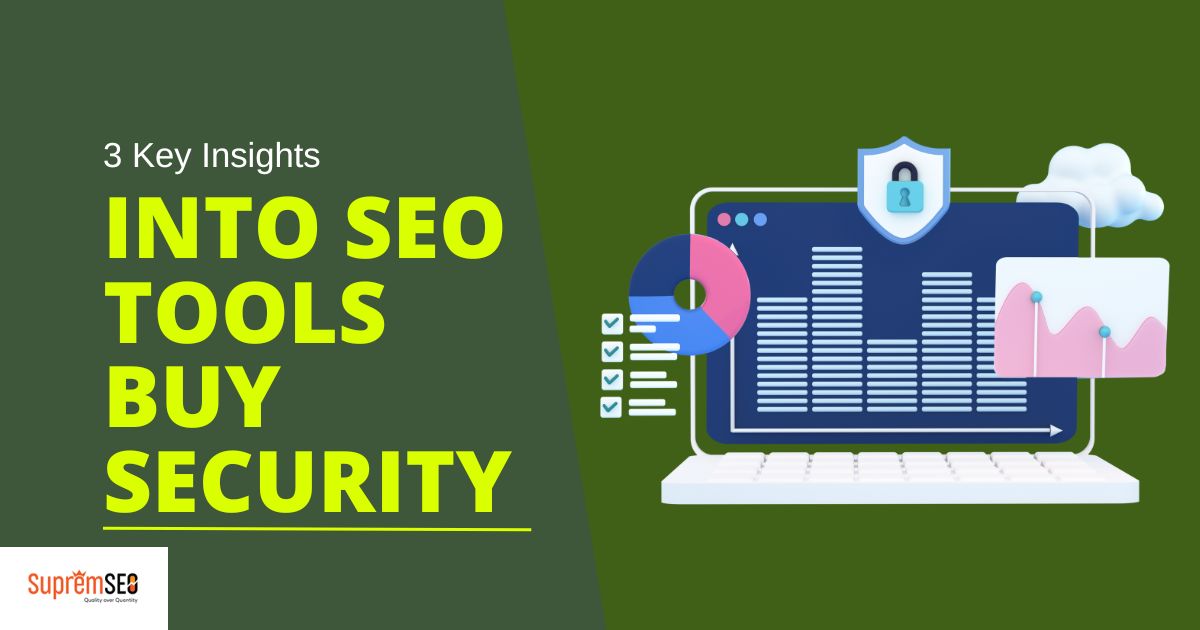SEO tools are essential for businesses that want to improve their online visibility and attract more customers. However, with the increasing number of cyber threats, it is important to consider the security of these tools. In this article, we will provide three key insights into SEO tools buy security.

The first insight is that businesses should choose SEO tools from reputable providers. Reputable providers have a track record of providing reliable and secure tools that protect their client’s data from cyber threats. It is important to do research and read reviews before selecting an SEO tool provider to ensure that they have a good reputation for security.
The second insight is that businesses should look for SEO tools that have built-in security features. These features can include encryption, two-factor authentication, and data backup. Encryption ensures that data is protected during transmission, two-factor authentication adds an extra layer of security to user accounts, and data backup ensures that data can be recovered in case of a cyber-attack or data loss.
Understanding SEO Tools and Their Impact on Security

Search engine optimization (SEO) tools are essential for businesses and website owners to improve their online visibility, but they can also pose a risk to their security. In this section, we will explore two key aspects of SEO tools and their impact on security: evaluating SEO software capabilities and trustworthiness and the role of SEO tools in safeguarding domain authority.
| Aspect | Key Points |
|---|---|
| Choosing SEO Tools | – Select from reputable providers.<br>- Check for built-in security features such as encryption, two-factor authentication, and data backup. |
| Evaluating Software Capabilities | – Assess tool capabilities like keyword research and content optimization.<br>- Consider software trustworthiness, including security and reliability.<br>- Verify provider support and reputation. |
| Safeguarding Domain Authority | – Use tools to gain insights into domain authority and backlinks.<br>- Identify and mitigate potential security threats with tools like Google Search Console. |
| Strategic Implementation | – Integrate tools to cover all website performance aspects.<br>- Automate repetitive tasks to save time and enhance efficiency.<br>- Utilize technical SEO tools to address issues affecting search rankings. |
| Maximizing SEO Value | – Use advanced analytics for targeted content strategies.<br>- Conduct competitive analysis and market insights to improve online presence.<br>- Continually adapt and optimize based on SEO audits and user experience assessments. |
Evaluating SEO Software Capabilities and Trustworthiness
When selecting an SEO tool, businesses and website owners should consider the software’s capabilities and trustworthiness. Capabilities refer to the tool’s ability to perform specific tasks, such as keyword research or content optimization, while trustworthiness refers to the tool’s reliability, accuracy, and security.
Several powerful SEO tools available in the market include Semrush, Ahrefs, Google Search Console, Surfer, Clearscope, ChatGPT, and Jasper. Each of these tools offers its own set of features and strengths, and businesses should evaluate them based on their specific needs and goals.
In addition to evaluating capabilities, businesses and website owners should also consider trustworthiness when selecting an SEO tool. Trustworthy tools should have a proven track record of security, accuracy, and reliability. It is also important to ensure that the tool is backed by a reputable company with a strong customer support system.
The Role of SEO Tools in Safeguarding Domain Authority
Domain authority is a crucial factor in SEO, and businesses and website owners should take steps to safeguard it. SEO tools can play a vital role in this process by providing insights into domain authority and identifying potential threats.
For instance, Semrush provides a domain overview report that includes information on domain authority, backlinks, and organic search traffic. Ahrefs also offers a domain rating feature that measures the strength of a website’s backlink profile.
In addition to providing insights into domain authority, SEO tools can also help businesses and website owners identify and address security threats. For example, Google Search Console offers a security issues report that alerts website owners to potential security threats and SEO issues, such as malware, hacked content, or other vulnerabilities affecting their search visibility.
In conclusion, businesses and website owners should carefully evaluate SEO tools based on their capabilities and trustworthiness and leverage them to safeguard their domain authority and address potential security threats.
Strategic Implementation of SEO Tools for Optimal Performance

Implementing SEO tools can be a game-changer for businesses looking to improve their search engine rankings, drive organic traffic, and stay ahead of the competition. However, it is important to approach the implementation strategically to ensure optimal performance. Here are two key ways to implement SEO tools for optimal performance:
Leveraging Automation and Integration for Efficiency
Automation and integration are key to efficiency when it comes to SEO tools. By automating repetitive tasks, businesses can save time and resources and focus on more important aspects of their SEO strategies. For example, using tools that automate keyword research, link building, and content optimization can help businesses stay ahead of algorithm updates and improve their core web vitals.
Integration is also important when it comes to SEO tools. By integrating different tools, businesses can create a more comprehensive SEO strategy that covers all aspects of their website performance. For example, integrating a technical SEO tool with a content optimization tool can help businesses identify and fix technical issues that may be affecting their search rankings while also optimizing their content for better search engine visibility.
Enhancing Website Performance with Technical SEO
Technical SEO is a critical component of any SEO strategy, and using the right tools can help businesses improve their website performance and, ultimately, their search rankings. Technical SEO tools can help businesses identify and fix issues related to website speed, mobile responsiveness, and security, all of which are important factors in Google’s search algorithm.
By using technical SEO tools, businesses can also optimize their websites for core web vitals, significantly enhancing their SEO performance. These vital metrics are crucial in executing effective SEO strategies that improve user experience and website performance. Improving core web vitals can help businesses improve their search rankings, drive more organic traffic, and ultimately improve their bottom line.
In conclusion, strategically implementing SEO tools is key to improving search engine rankings, driving organic traffic, and staying ahead of the competition. By leveraging automation and integration for efficiency and enhancing website performance with technical SEO, businesses can create a comprehensive SEO strategy that meets their business needs and bolsters their SEO efforts.
Maximizing SEO Value Through Advanced Analytics and Research
Advanced analytics and research are crucial components of SEO tools that can help businesses optimize their online presence. By utilizing keyword research tools, competitive analysis, and market insights, companies can improve their content strategy, target audience, and, ultimately, their SEO.
Utilizing Keyword Research Tools for Targeted Content
Keyword research is a critical part of SEO that involves identifying a website’s most relevant and high-traffic keywords. By using keyword research tools, businesses can analyze the search intent, volume, and SERP ranking of specific keywords to create targeted content that aligns with their audience’s needs and enhances visibility on the search engine results page.
Keyword research tools can also help identify long-tail keywords that can drive organic search traffic to a website. By incorporating these keywords into their content, businesses can increase their visibility in search engine results and improve their overall SEO.
Competitive Analysis and Market Insights
Competitive analysis and market insights are essential components of SEO tools that can help businesses identify their competitors’ strengths and weaknesses. By analyzing their competitors’ content strategy, target audience, and keyword usage, businesses can gain valuable insights into how to improve their own online presence.
Market insights can also help businesses identify emerging trends and opportunities in their industry. By staying up-to-date with the latest market trends, businesses can create content that resonates with their audience and improves their overall SEO.
In conclusion, advanced analytics and research are critical components of SEO tools that can help businesses optimize their online presence and achieve greater SEO success. By utilizing keyword research tools, competitive analysis, and market insights, businesses can improve their content strategy, target audience, and, ultimately, their SEO.
Ensuring Continuous Improvement and Adaptation
To stay ahead of the competition, it is important to continuously improve and adapt your SEO strategies. This requires keeping up with algorithm updates and SEO trends, conducting regular SEO audits, and optimizing user experience.
Staying Ahead with Algorithm Updates and SEO Trends
Search engine algorithms are constantly evolving, and staying up-to-date with the latest updates and trends is crucial for maintaining a strong SEO strategy. By keeping an eye on algorithm changes and SEO trends, businesses can adjust their strategies accordingly and stay ahead of the curve.
One of the most important SEO trends to keep in mind is user intent. Search engines are placing more emphasis on matching search results to user intent, so it is important to optimize content accordingly. This means focusing on creating valuable content that meets the needs of your target audience and includes relevant keywords.
Another important trend is the rise of voice search. As more people use voice assistants like Siri and Alexa to search the web, it is important to optimize content for voice search queries. This means using natural language and long-tail keywords that match the way people speak.
Regular SEO Audits and User Experience Optimization
In addition to keeping up with algorithm updates and SEO trends, it is important to conduct regular SEO audits and optimize user experience. This involves analyzing performance metrics, conducting backlink analysis, and optimizing on-page SEO elements like meta descriptions.
One of the most important aspects of user experience optimization is page speed. Slow-loading pages can negatively impact user experience and lead to higher bounce rates. By optimizing page speed and ensuring that pages load quickly, businesses can improve user experience and boost their SEO rankings.
In conclusion, ensuring continuous improvement and adaptation is crucial for maintaining a strong SEO strategy. By staying up-to-date with algorithm updates and SEO trends, conducting regular SEO audits, and optimizing user experience, businesses can stay ahead of the competition and achieve long-term success.
Frequently Asked Questions
What are the essential features to look for when purchasing SEO tools for enhanced security?
When purchasing SEO tools for enhanced security, it is essential to look for features such as secure data storage, data encryption, and access controls. Additionally, tools that offer regular software updates and have a dedicated security team are preferable.
How do SEO tools contribute to the overall security of digital marketing efforts?
SEO tools contribute to the overall security of digital marketing efforts by providing secure data storage, data encryption, and access controls. They also help identify potential security vulnerabilities and provide recommendations for remediation.
What are the best practices for ensuring data security when using SEO tools?
The best practices for ensuring data security when using SEO tools include using strong passwords, limiting access to sensitive data, and regularly reviewing access logs. Additionally, it is essential to use tools from reputable vendors and keep them up to date with the latest security patches.
Can free SEO tools provide reliable security for users’ data?
While some free SEO tools may provide reliable security for users’ data, it is generally recommended to use paid tools that offer dedicated security teams and regular software updates. Free tools may not have the same level of security as paid tools and may be more susceptible to security vulnerabilities.
How does Google Analytics factor into the security considerations of SEO tools?
Google Analytics can factor into the security considerations of SEO tools by providing insights into potential security vulnerabilities. By monitoring website traffic and user behavior, Google Analytics can help identify potential security threats and provide recommendations for remediation.
What steps should beginners take to balance SEO effectiveness with security concerns?
Beginners should take steps such as using reputable SEO tools from trusted vendors, limiting access to sensitive data, and regularly reviewing access logs. Additionally, it is essential to keep tools up to date with the latest security patches and use strong passwords to ensure data security.










